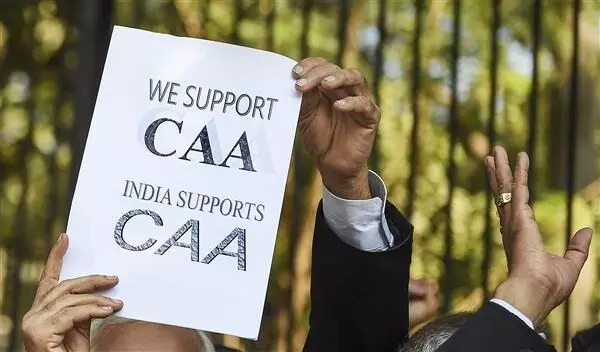Govt announces implementation of CAA ahead of Lok Sabha elections
Citizenship (Amendment) Act, 2019, a move that comes four years after the contentious law was passed
By Newsmeter Network
New Delhi: The Centre on Monday announced the implementation of the Citizenship (Amendment) Act, 2019, a move that comes four years after the contentious law was passed and paves the way for citizenship to undocumented non-Muslim migrants from Pakistan, Bangladesh and Afghanistan.
The rules were notified days ahead of the expected announcement of the Lok Sabha elections. With this, the Modi government will now start granting Indian nationality to persecuted non-Muslim migrants -- Hindus, Sikhs, Jains, Buddhists, Parsis and Christians -- from the three countries.
"These rules, called the Citizenship (Amendment) Rules, 2024 will enable the persons eligible under CAA-2019 to apply for the grant of Indian citizenship," a Home Ministry spokesperson said.
"The applications will be submitted in a completely online mode for which a web portal has been provided," the spokesperson added.
The CAA was passed in December 2019 and subsequently got the president's assent but there were protests in several parts of the country against it, with many opposition parties speaking out against the law calling it "discriminatory". The law could not come into effect as rules had not been notified till now.
The Congress alleged that the timing of notifying the rules is evidently designed to polarise the coming Lok Sabha elections, especially in West Bengal and Assam.
Congress general secretary Jairam Ramesh also alleged that the announcement is yet another attempt to "manage the headlines" after the Supreme Court's strictures on the electoral bonds issue.
"After seeking nine extensions for the notification of the rules, the timing right before the elections is evidently designed to polarise the elections, especially in West Bengal and Assam," the Congress leader said.
Kerala CM Vijayan described CAA as a communally divisive law and asserted that it will not be implemented in the state.
According to the Manual on Parliamentary Work, the rules for any legislation should be framed within six months of presidential assent or the government has to seek an extension from the Committees on Subordinate Legislation in Lok Sabha and Rajya Sabha.
Since 2020, the Home Ministry has been taking extensions at regular intervals from the parliamentary committee for framing the rules.
No document will be sought from the applicants, an official said.
Over 100 people lost their lives during the anti-CAA protests or police action. On Monday, security was beefed up in Shaheen Bagh, Jamia and other areas of the national capital where anti-CAA protests were held in the past.
On December 27, 2023, Union Home Minister Amit Shah said that no one can stop the implementation of the CAA as it is the law of the land and accused West Bengal Chief Minister Mamata Banerjee of misleading people on the issue.
Addressing a party meeting in Kolkata, Shah said it is the BJP's commitment to implement the CAA.
The TMC, led by Mamata Banerjee, has been opposing the CAA since the beginning.
The promise of implementing the controversial CAA was a major poll plank of the BJP in the last Lok Sabha and Assembly polls in West Bengal. The saffron party's leaders consider it a plausible factor that led to the rise of the BJP in Bengal.
In the last two years, over 30 district magistrates and home secretaries in nine states have been given powers to grant citizenship to Hindus, Sikhs, Buddhists, Jains, Parsis and Christians coming from Afghanistan, Bangladesh and Pakistan under the Citizenship Act, 1955.
According to the annual report of the Ministry of Home Affairs for 2021-22, from April 1, 2021, to December 31, 2021, a total of 1,414 foreigners belonging to these non-Muslim minority communities from the three countries were given Indian citizenship by registration or naturalisation under the Citizenship Act, 1955.
The nine states where Indian citizenship by registration or naturalisation is given under the Citizenship Act, 1955 to non-Muslim minorities from Pakistan, Bangladesh and Afghanistan are Gujarat, Rajasthan, Chhattisgarh, Haryana, Punjab, Madhya Pradesh, Uttar Pradesh, Delhi and Maharashtra.
Authorities of none of the districts of Assam and West Bengal, where the issue is politically very sensitive, have been given the powers so far.
AIMIM president Asaduddin Owaisi on Monday said the Citizenship (Amendment) Act is divisive and based on Godse’s thought that "wanted to reduce Muslims to second-class citizens". Reacting to Centre notifying the rules for the Citizenship (Amendment) Act, the Hyderabad MP alleged along with NPR-NRC, CAA is meant to only target Muslims and it serves no other purpose.
"Understand the chronology. First the election season will come, next will be the CAA rules," he said.
"Indians who came out on the streets to oppose CAA NPR NRC will have no choice but to oppose it again," Owaisi said in a post on 'X', while stating that his objections to CAA remain the same. Batting for asylum for "anyone who is persecuted," he said said citizenship must not be based on religion or nationality.
Inputs from PTI